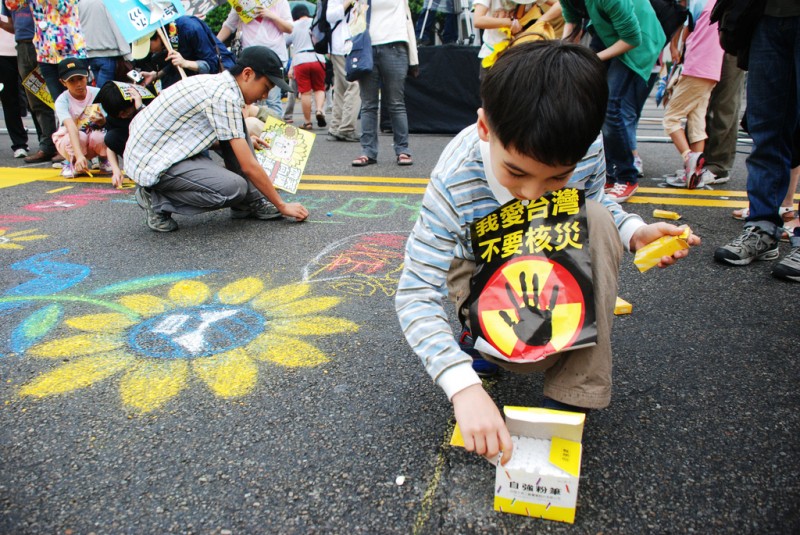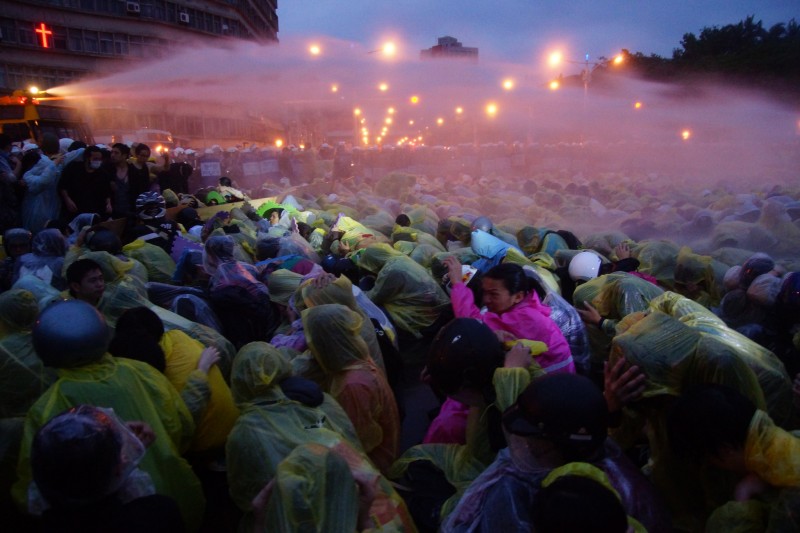
An anti-nuclear demonstration in April 2011. The poster attached to the boy says “I love Taiwan, and I do not want nuclear incidents”. Photo by coolloud.org. CC BY-NC 2.0.
In the first week after the Fukushima nuclear incident in March 2011, rice and noodles were sold out in the supermarket closest to my home in the Tokyo area, which is about 200 km away from the site of nuclear accident. In that week, not only Tokyo residents, but the whole world was in a panic about radiation contamination.
Today, in 2015, we still have concerns regarding the radioactive water from the Fukushima nuclear power plant leaking to the sea. Agricultural products from several prefectures in Japan are still prohibited from being imported into several countries, including Korea and Taiwan, despite bilateral negotiations between governments. On the other hand, in spite of moves by the Japanese government to restart nuclear power plants, all the nuclear power plants in Japan remain closed.
The Fukushima nuclear accident rang the knell for nuclear power not only in Japan, but also in Taiwan, which is also located on the so-called Pacific Ring of Fire. There are three active nuclear power plants in Taiwan, and two of them are very close to its capital city, Taipei. Because the first and second nuclear power plants are planned to be decommissioned in the future six years, the fourth one was built to replace these two. Nevertheless, after a huge demonstration in April 2014, the construction of the fourth nuclear power plant was stopped, and it is scheduled to be mothballed in July 2015. On the other hand, due to the safety concerns and problems with nuclear waste, the first and second nuclear power plants are considered to be decommissioned as scheduled, or even earlier.
“A nuclear-free home”, a popular slogan in anti-nuclear rallies in Taiwan, has finally become part of the social and political consensus. The chairpersons of the two major political parties, Kuomintang and Democratic Progressive Party, have both expressed their commitment to abandoning nuclear power and developing alternative energy strategies. On the other hand, the current government headed by President Ma Ying-Jeou (who will leave the office in 2016) still sees the vision of “a nuclear-free home” as an obstacle to economic growth.
In response to Ma's inertia with regard to nuclear energy, civil society is exploring various paths toward building a nuclear-free Taiwan. Their hope is to develop alternative energy sources to replace nuclear power, and to export this technology to boost economic growth. Taiwan’s three nuclear power plants generate only 10-20% of the country’s electricity supply. The prospect of cheap solar panels combined with powerful batteries is a source of hope, as Taiwan is a major manufacturer of solar cells. Geothermal power is also promising. Professor Kao Cheng-Yen, an anti-nuclear veteran, recently founded a geothermal power company, and Eric Chu, the mayor of New Taipei City, plans to build a geothermal power plant in New Taipei City in partnership with the Industrial Technology Research Institute.
Another strategy in Taiwan is efficient energy use. In South Korea, which has been affected by its own nuclear scandal, the mayor of the capital city, Seoul, declared a ‘One less nuclear power plant’ energy policy. In addition to generating electricity from renewable sources, they also put emphasis on energy efficiency and energy saving. Because energy efficiency and energy saving is easier said than done, the anti-nuclear citizens groups in Taiwan are trying to learn from the South Korean experience.

An anti-nuclear demonstration in April 2014. The police used water canons to evict protesters from the area. Photo by coolloud.org. CC BY-NC 2.0.
After the Fukushima nuclear incident, I attended several anti-nuclear demonstrations in both Tokyo and Taipei. What I observed in these demonstrations continues to surprise me: governments do not try to open discussions with the protesters, but devote their energy to suppressing their voices. During the April 2014 protest in Taipei, the police, started the eviction, aimed water canons at us protesters, who were just ordinary citizens demanding that the government reconsider its nuclear power policy. However, the government turned a blind eye to the actions of the police.
Going against Taiwanese people's aspirations for a nuclear-free home, President Ma's administration is attempting to extend the life span of the first and the second nuclear power plants. To solve the problem of the shortage of the storage space for nuclear waste, President Ma's administration proposes to send 1,200 highly radioactive used fuel rods overseas for reprocessing. This proposal, which was suspended by the Legislative Yuan this March, is expensive and ineffective, as the processed nuclear waste will eventually be sent back to the island. Moreover, several experts on the International Panel on Fissile Materials are worried about that reprocessing processes will have an impact on nuclear weapons proliferation, because approximately 2 tons of plutonium will be recovered from the reprocessing Taiwan's spent fuel rods. The deadlock on the storage of nuclear waste will not be loosened if President Ma's Administration and the Taiwan Power Company do not try a more flexible and practical approach, and start the conversation with the anti-nuclear citizen groups.
The path to a nuclear-free country is never easy, and it takes decades to see it come to fruition. Since next-generation politicians in Taiwan are ready to open the conversation with the anti-nuclear citizens groups and pave the way towards a nuclear-free country, it would be beneficial for the whole society to start the conversation between the government and the civil groups as early as possible.
(The author thanks Tan Uichi, a graduate student in the social sciences PhD program at Hitotsubashi University, for providing key information and comments for this article).








1 comment